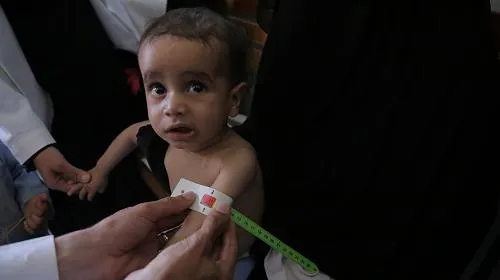SANAA (November 1, 2018) – Amid discussion of a famine declaration in Yemen, CARE calls for the implementation of an immediate ceasefire and political action to end the conflict. Only political will for peace can stop the fast deteriorating food and currency crisis in Yemen.
Almost half the population of Yemen – 14 million people – are now at risk of famine. Currently, food security experts are conducting data analysis to determine whether famine can be declared in Yemen.
“A declaration of famine would mean that the international community has already failed the people of Yemen,” says Jolien Veldwijk, CARE’s Assistant Country Director in Yemen. “Two of the thresholds needed to declare a famine – death rates and acute malnutrition rates – are lagging indicators, which means that by the time these thresholds are met, people are already dying.”
Yemeni people are dealing with a nightmarish combination of factors: daily airstrikes and attacks, a lack of healthcare and public services, increases in diseases like cholera, and severe food insecurity due to the economic crisis.
“The economy has been crippled during this war,” says Veldwijk. “Food and fuel prices have simply risen out of the reach of most people. There is widespread malnutrition and food insecurity, and those affected the most are women and girls, who often have more complex nutritional requirements.”
Through cash and voucher transfers CARE supports the most vulnerable and conflict-affected families to meet their basic and immediate needs and avoid using negative coping strategies. CARE is also implementing a food distribution in collaboration with World Food Programme in several governorates in the north and south of Yemen.
As the world waits to see whether famine is announced, Veldwijk notes; “whether widespread famine is declared or not in the coming weeks, the reality is that half of the Yemeni people do not know where their next meal will come from.” One Yemeni mother – Qayma – told CARE staff; “I don’t know how to feed my children. I don’t want to watch my children starve to death.”
CARE welcomes the recent call by US Defense Secretary James Mattis for a quick ceasefire in Yemen and support for a UN-brokered peace plan; as well as UK Foreign Secretary Jeremy Hunt’s support for a ceasefire that will allow for humanitarian corridors to ensure the safe passage of aid.
While these statements are moves in the right direction, it is imperative now that all parties to the conflict take action to implement an immediate ceasefire and participate fully in peace talks. The only real and lasting solution to the catastrophic humanitarian crisis in Yemen is a political solution to the ongoing conflict. Urgent action is needed right now to end the suffering of unthinkable millions of people. This human tragedy must come to an immediate end.
“People are in urgent need of humanitarian aid in order to survive,” says Fat’hiah, a Field Officer with CARE in Yemen. “But this is not a solution. The only solution is to bring peace to our country. Peace is our only hope.”
***
The number of people in need of humanitarian assistance in Yemen is over 22 million. That is 75% of the population. It is also equivalent to more than half the population of California, and exceeds the total population of some of the largest states, such as Florida and New York. This is an almost unimaginably vast number of people who, without humanitarian assistance, would be unable to meet their daily basic needs.
CARE has been working across Yemen since 1992 focusing on women’s and youth economic empowerment; prevention of gender-based violence; social inclusion; water resource management; civil society strengthening; good governance; and providing humanitarian assistance. CARE has a long history of implementing both development and humanitarian programming aiming to increase people’s ability to cope with crises and preparedness. CARE has at least 215 national and international staff overall in Yemen.
About CARE:
Founded in 1945, CARE is a leading humanitarian organization fighting global poverty. CARE has more than seven decades of experience helping people prepare for disasters, providing lifesaving assistance when a crisis hits, and helping communities recover after the emergency has passed. CARE places special focus on women and children who are often disproportionately affected by disasters. Last year, CARE worked in 94 countries to reach 80 million people, including more than 11 million through emergency response and humanitarian aid. To learn more, visit www.care.org
Media Contact:
Nicole Harris, 404-735-0871 nharris@care.org
Mahmoud Shabeeb, +962-79-146-39-03 mshabeeb@care.org (based in Amman, Jordan)

